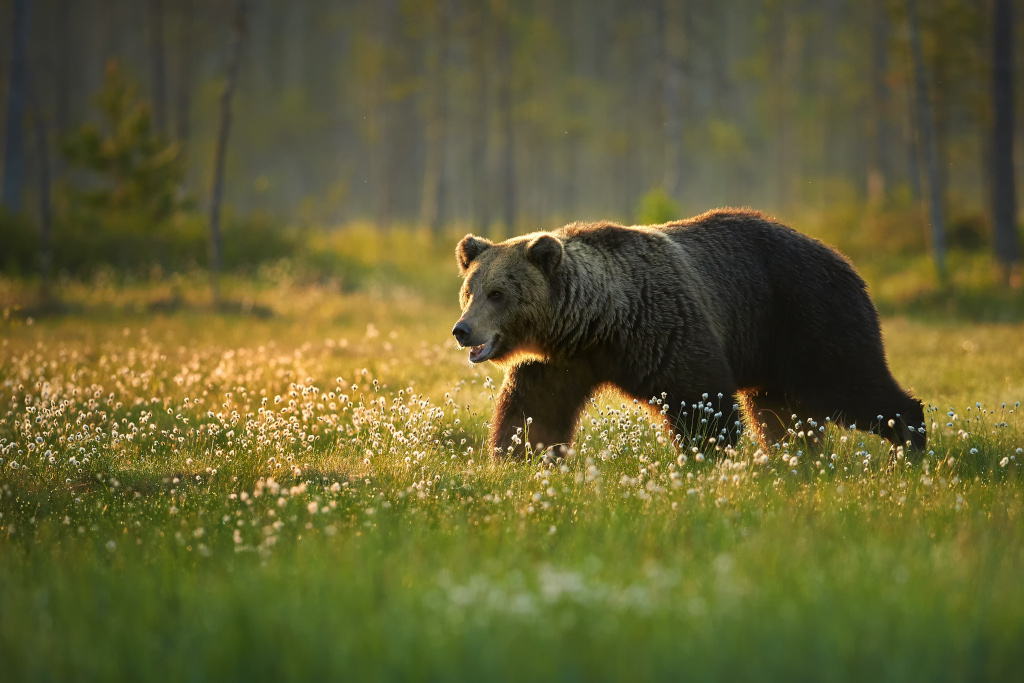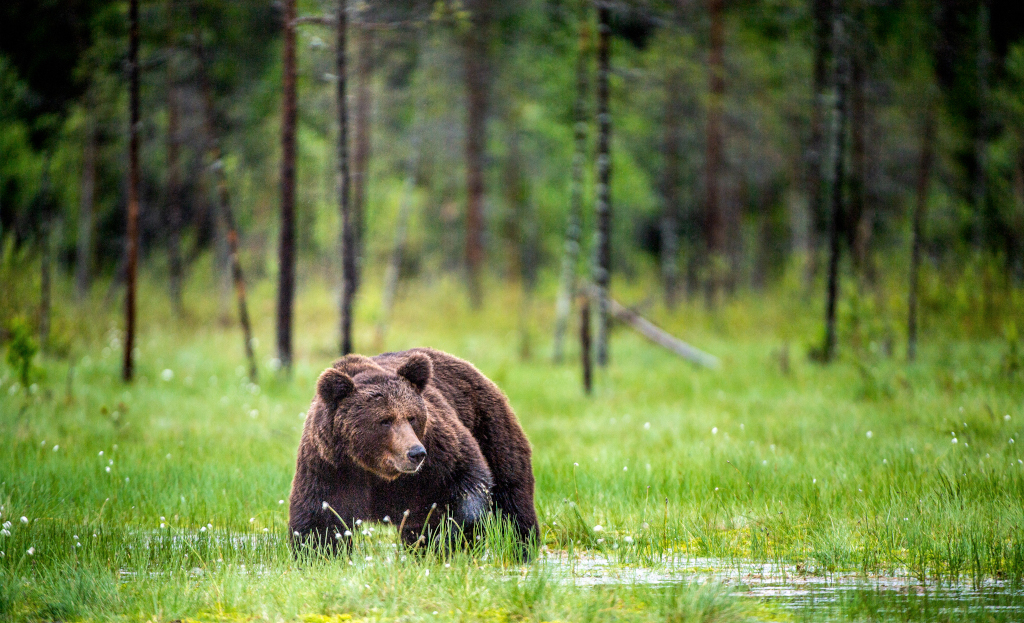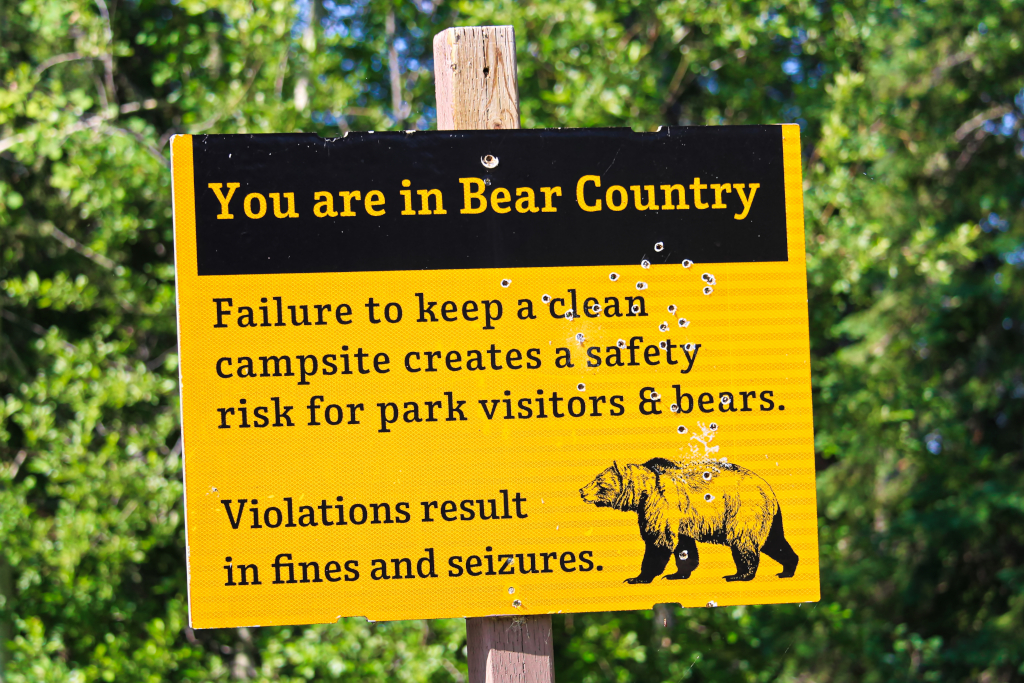Hiking and camping with dogs are a lot of fun. One of the best parts is that you get to explore new areas and experience new things.
However, if you’re not careful about what time of year you trek through those woods or mountains, you might encounter some unexpected visitors, like bears!
Fortunately for us, though not for them, bears are usually more afraid of humans than we are of them.
With a bit of preparation and knowledge beforehand, there’s no reason why we can’t enjoy our time in the wilderness without running into any potentially dangerous animals along the way!
And if you do encounter a bear out on an adventure, here’s what you need to do.
1. Don't Run!

No matter what you do, don’t run! As running will provoke their instinct to chase you, and they’re fast runners too! Plus, it’s unlikely that you would be able to outrun one.
In fact, the world’s fastest man, Usain Bolt, would have no chance against a bear. At top speed, Usain Bolt can run 27.33 miles per hour. But grizzly bears can hit a top speed of 35 miles per hour!
So if you happen to come across a bear, don’t run, keep your dog close, and stay calm.
2. If the Bear Doesn't See You, Leave Slowly & Quietly.
Sometimes, bears don’t see us at all. If this is the case, leave very slowly and be very careful not to startle it! As you’re leaving, make sure to watch your dog, stay calm, don’t make any sudden movements or loud noises, and back away quietly to give the bear space and let it continue whatever it was doing undisturbed.
3. If the Bear Sees You, Stand Your Ground.
As scary as it might be to stand your ground against a bear, that is what you need to do exactly. Also, make sure not to make any sudden movements, and ensure to speak calmly and move your arms to let it know that you are human. Some bears might come close and stand on their hind legs to get a better look at you, but remember that standing isn’t a sign of aggression.
4. If the Bear Approaches You, Make Yourself Look Big & Tall.
If the bear does see you and approach you, try your best to look big and tall! You can do this by standing tall, holding your arms out to the side, and waving them over your head.
Now, if the bear stops moving towards you, back away slowly, but if it continues to follow you, stand your ground, continue making yourself look as big and tall as possible, and toss something (non-food related) onto the ground. This might distract the bear and allow you to escape.
5. If the Bear Charges You, it Usually is a Bluff Charge.

If the bear charges you, the chances are that it’s just a bluff charge. And what you will find is the bear will move in big leaps with its head and ears up to try to make itself look as big and intimidating as possible. But the bear will stop on its tracks before getting too close to you, then veer off to one side.
So if it looks like a bluff charge to you, don’t run, stay calm, hold your ground, wave your arms and speak to the bear in a calm tone. This way, the bear knows you aren’t a threat to it and will stop and retreat.
6. But if a Black Bear Charges and Attacks You, Fight Back!
If you find yourself attacked by a black bear after all of this, then fight back with anything available. Use whatever is closest to your reach, and start wailing on it. Sticks, rocks, your own fists, or bear spray if you have it. Punch it in the face and muzzle, and hopefully, the bear will retreat.
7. And if it is a Grizzly Bear That Charges and Attacks You, Play Dead.
If a brown or grizzly bear charges and is going to attack you, play dead! Lie down on your stomach, spread your legs, cover your neck and head with your hands, and leave your pack on. This will reduce the chance of being hurt by the bear.
Stay silent and try not to move. Once the bear realizes you aren’t a threat to it and its cubs, it will know that attacking is useless and there’s nothing for them to gain from fighting you, hence will turn around and leave. But if it didn’t stop attacking you, then fight back!
Bear Behavior & Body Language to Watch Out For
It can be dangerous to encounter a bear not knowing you are getting too close to its territory. Luckily, there are some signs that you will be able to spot beforehand.
If you see the bear exhibits the following behavior:
- Clacking its teeth
- Hitting the ground with its front paws
- Bluff charging
- Snorting
This means you are getting too close to it, and the bear is becoming agitated! Get out of there! Otherwise, it may come at you with its head down low and ears pointed backward, which is a real aggressive charge.
Bear Attacks & How to Avoid One

Regardless if you are camping or hiking with your dog in bear country or not, it is best to know how to avoid a bear attack.
1. Keep Your Dog on a Leash.
If you are in bear country, always keep your dog on a leash at all times. The last thing you want is to let your dog wander off and risk encountering a bear. What’s worse is that your dog may provoke a predatory bear to chase and lead it back to you, so it’s best to keep them leashed.
2. Never Get Between a Mama Bear & Her Babies.
If you see a mother bear with cubs, never get between them! This is the same as for any other animal species. Do not get between a mother and her babies, as the mama bear will do anything to protect her cubs, which may include attacking you.
3. Make Noise & Wear Bear Bells.
One way to avoid a surprise is to make some noise while walking in the woods, for instance, sing, talk loudly, clap your hands, etc. All that can alert bears of your presence and prevent them from getting startled. And hiking with some bear bells on is always a great idea!
4. Be on High Alert.
Another way to avoid a surprise is not to let your guard down even if you can’t see or hear any bears nearby. Otherwise, you may risk bumping into one. So always be aware of your surroundings and watch for any bear signs, like scat, digs, grazed vegetation, and marking trees and poles.
5. Avoid Hiking at Dawn & Dusk.
Avoid hiking or running with your dog during dawn and dusk, as bears are most active at these times. Plus, the fact that it’s more difficult to see bears at dawn and dusk means that you risk bumping into one and failing to see it until it’s too late.
6. Travel in Groups.
It’s also best to travel or hike in groups. This way, you will have a better chance of not encountering a bear. The reason is that groups of people look intimidating to bears due to the cumulative size.
7. Carry Bear Spray.
One of the best ways to defend yourself against a bear is with bear spray. In fact, studies show that these sprays have over a 90% success rate in warding off bears. So make sure to pack some in your backpack when out camping or hiking in bear country!
Read More: What to Put in Your Dog’s Pack?
8. Never Keep Food in Your Tent.
Bears have a keen sense of smell and can easily trace these aromas from afar, which means they will come into your campsite if there are any scents or food smells lingering around. And you surely don’t want that.
So, you would need to be extra careful not to bring any food, including your dog’s, into your camping tent. Otherwise, you risk attracting bears and other predatory animals to your campsite at night.
Make sure to use campground bear-resistant food storage boxes or bear-proof containers. Also, ensure that your food storage and cooking areas are at least 100 feet away from your sleeping tent, especially when in the backcountry.
Read More: Can Dogs Sleep in Camping Tents?
Conclusion
If you’re out camping and go for a hike or run with your dog and think that you might run into some bears, it’s essential to be equipped with the knowledge of what you need to do when finding yourself stuck in a bear encounter.
Make sure to carry some protection like bear spray. This way, if an encounter does happen, you will have something on hand to use against the animal and protect yourself from harm.
The most important things to remember are remaining calm, not running, and slowly backing away. Otherwise, you may provoke the bear’s instincts to chase after you, which could lead to dire consequences.
